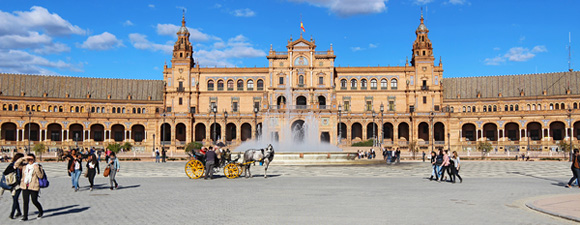Moving to Seville, Spain
Last updated on Jul 25, 2023
Summary: Moving to Seville, Spain: With a population of approximately 708,000 people, Seville has a moderate cost of living and 60s and 70s from October through April and reaches the high 90s in July and August. Expats, retirees and digital nomads talk about everything you need to know before moving to Seville.

What do I need to know before moving to Seville?
When we asked people what advice they would give someone preparing to move to Seville, they said:
"Seville is the capital of Andalusia and the fourth largest city in Spain, known for its rich history, stunning architecture, and vibrant culture. The official language is Spanish, so it would be beneficial to learn some basic phrases before moving. The cost of living in Seville is relatively low compared to other major European cities, but it's still important to budget accordingly. Seville has a Mediterranean climate with hot summers and mild winters, so pack your wardrobe accordingly. The city is famous for its festivals, such as the Feria de Abril and Semana Santa, which are important cultural events that attract visitors from around the world. Seville's public transportation system is efficient and affordable, with buses, trams, and a metro system that make it easy to get around the city. However, Seville is also a very walkable city with many pedestrian-friendly areas. The healthcare system in Spain is of a high standard, with both public and private healthcare available. It's important to have health insurance coverage, as public healthcare is not free for non-residents. Seville has a variety of housing options, from modern apartments in the city center to traditional houses in the suburbs. It's recommended to use a real estate agent to help navigate the housing market. Spanish cuisine is a big part of life in Seville, with tapas bars and seafood restaurants being particularly popular. The city is also known for its flamenco culture, with many bars and clubs offering live performances. Seville is generally a safe city, but like any major city, it's important to be aware of your surroundings and take precautions to avoid pickpocketing and other petty crimes. Finally, it's important to note that siestas are a part of daily life in Seville. Many businesses close in the afternoon for a few hours, so plan your day accordingly," said one expat in Seville.
How do I find a place to live in Seville?
Please login to continue reading this article.
Not a member? Join Today (it's free).
About the Author
 Joshua Wood, LPC joined Expat Exchange in 2000 and serves as one of its Co-Presidents. He is also one of the Founders of Digital Nomad Exchange. Prior to Expat Exchange, Joshua worked for NBC Cable (MSNBC and CNBC
Primetime). Joshua has a BA from Syracuse and a Master's in Clinical and Counseling Psychology from Fairleigh Dickinson University. Mr. Wood is also a licensed counselor and psychotherapist.
Joshua Wood, LPC joined Expat Exchange in 2000 and serves as one of its Co-Presidents. He is also one of the Founders of Digital Nomad Exchange. Prior to Expat Exchange, Joshua worked for NBC Cable (MSNBC and CNBC
Primetime). Joshua has a BA from Syracuse and a Master's in Clinical and Counseling Psychology from Fairleigh Dickinson University. Mr. Wood is also a licensed counselor and psychotherapist.
Some of Joshua's articles include Pros and Cons of Living in Portugal, 10 Best Places to Live in Ireland and Pros and Cons of Living in Uruguay. Connect with Joshua on LinkedIn.

 Seville, Spain
Seville, Spain

